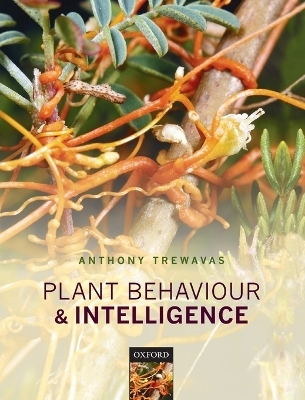
Plant Behaviour and Intelligence
Oxford University Press (Verlag)
978-0-19-953954-3 (ISBN)
This novel book is the first to properly address the controversial issue of plant intelligence, arguing convincingly that cells and whole plants growing in competitive wild conditions exhibit aspects of plant behaviour that can be accurately described as 'intelligent'. The author expands on three main insights drawn by the Nobel Prize winning botanist Barbara McClintock: firstly that plant cells may have knowledge of themselves; secondly that they receive challenges which lead to behavioural changes; finally, that they do so in a manner which implies assessment and intelligent behaviour. By equating the concept of intelligent behaviour with that of adaptively variable behaviour, the book provides a novel integration of signalling, behaviour, and behavioural ecology, all set within the context of plant studies. Plant Behaviour and Intelligence begins with chapters on the origins and multicellular nature of plant life, before going on to discuss novel behaviours such as branch initiation and growth, unusual behaviour of leaves, and how roots reconstruct their sensing systems and are capable of self-recognition. An entire chapter is devoted to the nature of intelligence and another to the vexed question of 'consciousness', as applied to plant life. This advanced textbook will be suitable for senior undergraduate and graduate level students taking related courses in plant ecology and evolution. It will also be of relevance and use to a broader audience of professional plant ecologists seeking an authoritative reference text to help them navigate the complexity and controversy of plant behaviour.
Anthony Trewavas obtained his B.Sc and Ph.D from University College, London in Biochemistry and went to do post doctoral research at the University of East Anglia and the University of Edinburgh, where he became Professor of Plant Biochemistry, as well as undertaking numerous visiting professorships abroad. He has published 250 papers and two books, and is an elected Fellow of the Royal Society of London, the Royal Society of Edinburgh, and Academia Europea and has been elected as a Life Member of the American Society of Plant Biology.
1. A feeling for the organism ; 2. Plant behaviour foundations ; 3. The origins of photosynthesis. 1.What are the salient characteristics of living systems? ; 4. The origins of photosynthesis. 2. The evolution of life and photosynthesis ; 5. Why did plants become multicellular? ; 6. Convergent evolution is common in plant systems ; 7. Are angiosperms more complex than mammals? ; 8. Plant behaviour: first intimations of self organisation ; 9. The varieties of plant behaviour ; 10. The self organising plant: lessons from swarm intelligence ; 11. Self-organisation: Cambium as the integration assessor ; 12. Self-organising capacity in leaf behaviour ; 13. Self-organisation and behaviour in root systems ; 14. Self-organisation in response to gravity ; 15. Signals other than gravity ; 16. Behavioural characteristics of seeds: elements of dormancy ; 17. Games plants play ; 18. Competition and cooperation between individual plants for mates and territory: the recognition of self ; 19. The nature of intelligent behaviour: cognition or adaptation? ; 20. Brains and nerve cells are not necessary for intelligent behaviour ; 21. Intelligent genomes ; 22. Cellular basis of intelligent behaviour ; 23. Cell organisation and protein networks ; 24. Instinct, reflex and conditioned behaviours: characteristics of plant behaviour? ; 25. Intelligence and consciousness ; 26. Intelligent foraging?
| Erscheint lt. Verlag | 21.8.2014 |
|---|---|
| Verlagsort | Oxford |
| Sprache | englisch |
| Maße | 208 x 247 mm |
| Gewicht | 788 g |
| Themenwelt | Naturwissenschaften ► Biologie ► Botanik |
| Naturwissenschaften ► Biologie ► Evolution | |
| Naturwissenschaften ► Biologie ► Zoologie | |
| ISBN-10 | 0-19-953954-5 / 0199539545 |
| ISBN-13 | 978-0-19-953954-3 / 9780199539543 |
| Zustand | Neuware |
| Informationen gemäß Produktsicherheitsverordnung (GPSR) | |
| Haben Sie eine Frage zum Produkt? |
aus dem Bereich


